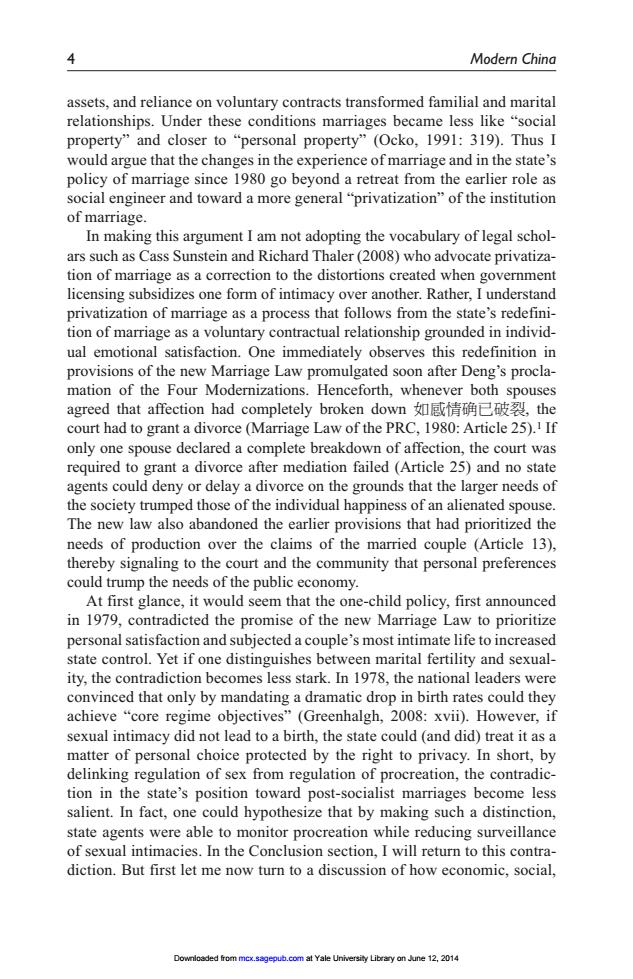正在加载图片...

Modern China assets,and reliance on voluntary contracts transformed familial and marital relationships.Under these conditions marriages became less like "social property”and closer to“personal property”(Ocko,l99l:319).Thus I would argue that the changes in the experience of marriage and in the state's policy of marriage since 1980 go beyond a retreat from the earlier role as social engineer and toward a more general "privatization"of the institution of marriage. In making this argument I am not adopting the vocabulary of legal schol- ars such as Cass Sunstein and Richard Thaler(2008)who advocate privatiza- tion of marriage as a correction to the distortions created when government licensing subsidizes one form of intimacy over another.Rather,I understand privatization of marriage as a process that follows from the state's redefini- tion of marriage as a voluntary contractual relationship grounded in individ- ual emotional satisfaction.One immediately observes this redefinition in provisions of the new Marriage Law promulgated soon after Deng's procla- mation of the Four Modernizations.Henceforth,whenever both spouses agreed that affection had completely broken down如感情确已破裂,the court had to grant a divorce (Marriage Law of the PRC,1980:Article 25).1 If only one spouse declared a complete breakdown of affection,the court was required to grant a divorce after mediation failed (Article 25)and no state agents could deny or delay a divorce on the grounds that the larger needs of the society trumped those of the individual happiness of an alienated spouse. The new law also abandoned the earlier provisions that had prioritized the needs of production over the claims of the married couple (Article 13), thereby signaling to the court and the community that personal preferences could trump the needs of the public economy. At first glance,it would seem that the one-child policy,first announced in 1979,contradicted the promise of the new Marriage Law to prioritize personal satisfaction and subjected a couple's most intimate life to increased state control.Yet if one distinguishes between marital fertility and sexual- ity,the contradiction becomes less stark.In 1978,the national leaders were convinced that only by mandating a dramatic drop in birth rates could they achieve "core regime objectives"(Greenhalgh,2008:xvii).However,if sexual intimacy did not lead to a birth,the state could (and did)treat it as a matter of personal choice protected by the right to privacy.In short,by delinking regulation of sex from regulation of procreation,the contradic- tion in the state's position toward post-socialist marriages become less salient.In fact,one could hypothesize that by making such a distinction, state agents were able to monitor procreation while reducing surveillance of sexual intimacies.In the Conclusion section,I will return to this contra- diction.But first let me now turn to a discussion of how economic,social, Downloaded from mcx.sagepub.com at Yale University Library on June 12,20144 Modern China assets, and reliance on voluntary contracts transformed familial and marital relationships. Under these conditions marriages became less like “social property” and closer to “personal property” (Ocko, 1991: 319). Thus I would argue that the changes in the experience of marriage and in the state’s policy of marriage since 1980 go beyond a retreat from the earlier role as social engineer and toward a more general “privatization” of the institution of marriage. In making this argument I am not adopting the vocabulary of legal scholars such as Cass Sunstein and Richard Thaler (2008) who advocate privatization of marriage as a correction to the distortions created when government licensing subsidizes one form of intimacy over another. Rather, I understand privatization of marriage as a process that follows from the state’s redefinition of marriage as a voluntary contractual relationship grounded in individual emotional satisfaction. One immediately observes this redefinition in provisions of the new Marriage Law promulgated soon after Deng’s proclamation of the Four Modernizations. Henceforth, whenever both spouses agreed that affection had completely broken down 如感情确已破裂, the court had to grant a divorce (Marriage Law of the PRC, 1980: Article 25).1 If only one spouse declared a complete breakdown of affection, the court was required to grant a divorce after mediation failed (Article 25) and no state agents could deny or delay a divorce on the grounds that the larger needs of the society trumped those of the individual happiness of an alienated spouse. The new law also abandoned the earlier provisions that had prioritized the needs of production over the claims of the married couple (Article 13), thereby signaling to the court and the community that personal preferences could trump the needs of the public economy. At first glance, it would seem that the one-child policy, first announced in 1979, contradicted the promise of the new Marriage Law to prioritize personal satisfaction and subjected a couple’s most intimate life to increased state control. Yet if one distinguishes between marital fertility and sexuality, the contradiction becomes less stark. In 1978, the national leaders were convinced that only by mandating a dramatic drop in birth rates could they achieve “core regime objectives” (Greenhalgh, 2008: xvii). However, if sexual intimacy did not lead to a birth, the state could (and did) treat it as a matter of personal choice protected by the right to privacy. In short, by delinking regulation of sex from regulation of procreation, the contradiction in the state’s position toward post-socialist marriages become less salient. In fact, one could hypothesize that by making such a distinction, state agents were able to monitor procreation while reducing surveillance of sexual intimacies. In the Conclusion section, I will return to this contradiction. But first let me now turn to a discussion of how economic, social, Downloaded from mcx.sagepub.com at Yale University Library on June 12, 2014